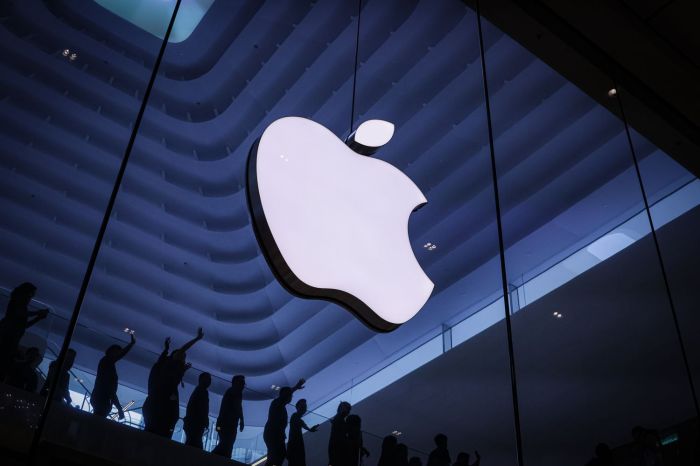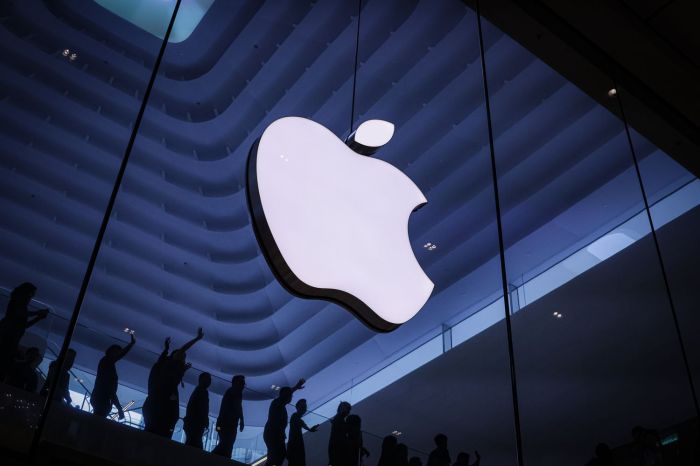The Apple EU fine, stemming from the Digital Markets Act (DMA), is reshaping the app store landscape. This investigation delves into the intricacies of the Apple EU fine digital markets act app store, exploring the DMA’s impact on Apple’s practices, app developers, and the future of the digital economy. The EU’s action raises critical questions about app store policies and the balance of power between tech giants and independent developers.
The EU Digital Markets Act aims to level the playing field for digital platforms, preventing anti-competitive behavior and promoting innovation. Apple’s app store policies, with its stringent rules and revenue-sharing mechanisms, have been under scrutiny. This analysis examines the specific charges against Apple, the potential consequences for app developers, and how the EU’s actions could ripple through the tech industry.
Overview of the EU Digital Markets Act (DMA)

The EU Digital Markets Act (DMA) is a landmark piece of legislation designed to reshape the digital economy within the European Union. It aims to foster a more competitive and consumer-friendly online environment by regulating the behavior of large digital platforms. This regulation addresses the significant power imbalance that exists between these platforms and smaller businesses and consumers.The DMA’s primary objective is to create a level playing field for businesses operating within the EU digital market.
It seeks to ensure fair competition and protect consumers from potentially anti-competitive practices. The act mandates that digital platforms adhere to specific rules and guidelines, promoting innovation and efficiency within the digital sphere.
Key Provisions Relevant to App Stores
The DMA’s provisions specifically targeting app stores are designed to curb the dominance of certain platforms and ensure a more equitable marketplace. This includes provisions for interoperability, non-discrimination, and data portability. These provisions are intended to prevent the creation of walled gardens, where users are essentially trapped within a single platform’s ecosystem.
Historical Context of the DMA’s Development
The DMA’s development stemmed from a growing recognition of the significant influence wielded by large digital platforms. Concerns about potential anti-competitive behavior, lack of consumer choice, and the stifling of innovation prompted the need for regulatory intervention. This recognition was fueled by the increasing concentration of power within a few dominant players in the digital market. The development of the DMA was a response to a confluence of factors, including the evolving digital landscape and the need to address potential issues arising from market dominance.
Scope and Impact of the DMA on the Digital Economy
The DMA’s scope extends beyond app stores to encompass a wider range of digital platforms. Its impact is anticipated to be profound, potentially reshaping the digital economy by fostering a more competitive environment. The DMA’s comprehensive approach seeks to mitigate potential harms from anti-competitive practices, and aims to promote greater choice and innovation. The impact will likely vary across different sectors, with some experiencing more significant changes than others.
Core Principles of the DMA
The DMA’s core principles are structured around ensuring fair competition, consumer protection, and innovation within the digital economy. This framework aims to address the unique challenges presented by the digital market.
| Principle | Description | Application |
|---|---|---|
| Interoperability | The ability of different digital platforms and services to work together seamlessly. | App stores must allow for interoperability between their platform and other competing services. |
| Non-discrimination | Preventing favoritism towards specific companies or products. | App stores cannot discriminate against competing apps or developers. |
| Data Portability | Allowing users to move their data from one platform to another. | Users should be able to transfer data generated on an app store to other services. |
| Market Dominance | Restricting the excessive power of dominant digital platforms. | Platforms with significant market share are subject to specific regulations. |
Apple’s App Store Policies and Practices
Apple’s App Store, a cornerstone of the mobile ecosystem, has established a complex system of policies and practices that govern the apps available to its users. These policies, while aimed at maintaining a high standard of user experience, have also been a source of considerable discussion and debate, particularly regarding their impact on app developers and the competitive landscape.
The EU’s fine against Apple for its App Store practices is definitely a big deal. It’s all about the Digital Markets Act, and how app stores operate. Interestingly, this news seems to be prompting some innovative moves in the phone industry. For example, the Essential Phone is reportedly developing its own smart assistant, which might be a response to the changing landscape of app store regulations.
It’ll be fascinating to see how this all plays out, and whether the EU’s stance on app stores will encourage more independent developments in the future. the essential phone will have its own smart assistant This could lead to a more competitive and user-friendly app ecosystem.
This section delves into the intricacies of Apple’s App Store, examining its policies, functionalities, financial mechanisms, and the broader implications for developers.
Apple’s Existing App Store Policies and Practices
Apple’s App Store operates under a set of strict guidelines designed to protect user safety and maintain a high level of quality. These policies cover various aspects, from app functionality to content restrictions, ensuring a consistent user experience. These rules often include provisions related to in-app purchases, user data privacy, and app security. The policies are intended to maintain a level of trust and prevent the proliferation of malicious or inappropriate content.
Key Features and Functionalities of Apple’s App Store
The App Store’s core functionality revolves around discovery, download, and management of applications. It employs a curated approach to app selection, with a review process that screens submitted apps against Apple’s guidelines. Features like user ratings, reviews, and in-app purchase options are integral parts of the platform, facilitating a transparent and user-friendly experience. Apple’s commitment to secure payment processing and user account management are critical elements of its approach.
Financial Mechanisms Used by Apple for App Developers
Apple’s financial structure for app developers is based on a commission structure for in-app purchases and sales. Developers receive a percentage of the revenue generated from their apps, while Apple takes a cut. This model, while seemingly straightforward, has been a point of contention, with some developers arguing that the commission rates are excessively high. Apple often emphasizes that these fees contribute to the costs of maintaining the App Store’s infrastructure, including security, support, and user experience enhancements.
The specific commission rate varies based on the app’s revenue category.
How Apple’s App Store Policies Affect Developers
Apple’s app store policies can significantly impact developers. While the policies aim to maintain a high level of user safety, some developers feel restricted by the stringent guidelines. The rigorous review process, for example, can lead to delays and rejection of applications. The commission structure, while providing a revenue stream, also reduces the profitability of some applications.
The Apple EU fine for the Digital Markets Act and the App Store are definitely creating some buzz. While I’m pondering the long-term implications, I’m also getting ready for game day with these amazing crock pot deals. Get ready for game day with these crock pot deals are a must-have for any fan. Hopefully, these deals can help us forget about the potential ripple effects of the EU’s decision on the app store and app development.
The balance between user protection and developer profitability is a key aspect of this discussion.
Comparison of App Store Policies
| Feature | Apple App Store | Google Play Store | Microsoft Store |
|---|---|---|---|
| Commission Rate | 30% on in-app purchases and sales, varying for specific categories. | Typically 15-30% on in-app purchases and sales, with lower rates for small businesses. | 30% on in-app purchases and sales. |
| Review Process | Rigorous and comprehensive, often requiring multiple iterations and substantial documentation. | Less stringent than Apple’s, often quicker turnaround time. | Similar to Apple’s in terms of thoroughness, aiming for balanced approach. |
| Developer Support | Comprehensive documentation, forums, and developer support teams. | Well-established support network and tools. | A dedicated support system with resources available to developers. |
This table highlights a comparative analysis of key aspects of the app store policies. It illustrates the variations in commission structures, review processes, and developer support systems across major app stores. The differences reflect the unique approaches each platform takes to managing its ecosystem.
The Fine Imposed on Apple
The European Union’s (EU) Digital Markets Act (DMA) aims to foster a more competitive digital market. This includes scrutinizing the practices of dominant players like Apple, who hold significant power within the app ecosystem. The recent fine levied against Apple represents a significant step in enforcing the DMA, and a potential shift in how app stores operate in the EU.The EU’s decision to fine Apple stems from alleged violations of the DMA related to its App Store policies.
This wasn’t a light penalty, and it signals a clear message from the EU that dominant digital platforms must comply with regulations aimed at ensuring fair competition. The specific nature of the violations and the ensuing fine are critical to understanding the implications for the tech industry as a whole.
Specifics of the EU Fine
The EU imposed a significant fine on Apple, reflecting its concerns about the company’s app store practices. The exact amount of the fine is a crucial element in understanding the severity of the alleged violations. This penalty is intended to incentivize compliance with the DMA and to discourage similar practices in the future.
Legal Arguments and Evidence
The EU’s case against Apple rested on specific legal arguments. These arguments likely centered on the competitive imbalance created by Apple’s control over its app store ecosystem. Evidence presented by the EU likely included data on the restrictions placed on app developers, the fees charged, and the limited options available for alternative payment methods. The EU’s investigation likely looked at how Apple’s policies might have hindered competition in the app market.
For instance, the EU likely scrutinized the practices around in-app purchases and how Apple’s policies could have given a competitive advantage to its own products or services.
Potential Ramifications for Apple’s Business Practices
The fine imposed on Apple has potential ramifications for its business practices. Apple might be forced to modify its app store policies to better comply with the DMA. These modifications could include more openness for developers, increased choice for users, and altered payment structures. The implications for Apple extend beyond the immediate fine, impacting its strategy for the EU market and potentially setting precedents for other jurisdictions.
In the past, companies facing similar issues have had to adapt their strategies. For example, Google faced challenges regarding Android app store policies.
Specific App Store Practices Cited as Problematic
The EU likely identified specific app store practices as problematic. These practices likely include but are not limited to:
- Exclusive Payment Systems: Apple’s preference for its own payment systems, potentially restricting alternative payment methods and disadvantaging competitors.
- Developer Restrictions: Policies that limit app developers’ choices regarding the way they interact with users, like using Apple’s own payment systems.
- In-App Purchase Policies: The way in-app purchases are handled and the commissions Apple charges for these transactions.
These practices were likely scrutinized in relation to their impact on the competitive landscape within the EU.
Timeline of Events Leading to the Fine
| Date | Event |
|---|---|
| 2020 | EU begins investigation into Apple’s App Store policies. |
| 2022 | EU issues formal statement regarding findings and rationale. |
| 2023 | EU imposes the fine on Apple. |
This timeline illustrates the period of investigation and the ultimate outcome. Each stage of the process played a critical role in the eventual imposition of the fine.
Impact of the DMA on App Developers

The EU Digital Markets Act (DMA) is poised to significantly reshape the app development landscape. This new regulatory framework aims to foster a fairer and more competitive environment for app developers, particularly independent creators, by leveling the playing field and curbing the monopolistic tendencies of large platforms. The implications are far-reaching, affecting everything from app store policies to the very strategies developers employ.The DMA’s primary focus is on ensuring fair competition and preventing gatekeepers from abusing their dominance.
This will undoubtedly lead to changes in app store policies and practices, and consequently, in the strategies employed by app developers to thrive in the new regulatory climate. The impact on innovation and consumer choice remains a central concern, as developers must navigate the new rules to continue creating valuable experiences.
Anticipated Impacts on Independent Developers, Apple eu fine digital markets act app store
Independent developers, often lacking the resources and influence of large corporations, will likely experience both challenges and opportunities under the DMA. The ability to reach a wider audience through the app stores, often controlled by a few major platforms, is crucial for independent developers. The DMA’s rules on interoperability and access to data will affect their ability to build and promote their applications.
Furthermore, these rules will create more transparency and control for developers to ensure that their apps are developed and maintained according to the requirements.
Anticipated Impacts on Large Companies
Large companies, often the dominant players in the app ecosystem, will face significant adjustments to their business models and practices. The DMA will mandate changes in their app store policies, requiring them to offer more transparency and ensure fair competition. This will likely impact their revenue streams, as well as their influence over the market. Their ability to maintain their dominant position in the market will be subject to scrutiny, as the DMA aims to prevent monopolistic practices.
Potential App Development Strategies Under the DMA
Developers will need to adapt their strategies to comply with the DMA’s requirements. This will likely involve creating more streamlined and open app stores, facilitating better interoperability, and providing access to necessary data. For example, independent developers might focus on creating apps for specific niches or partnering with other companies to gain access to wider audiences. Large companies might need to reconsider their approach to app store policies, promoting innovation and fair access.
Challenges and Opportunities Faced by Developers
The DMA presents both challenges and opportunities for developers. The primary challenge will be adapting to the new rules and regulations, which could involve significant costs and changes in development processes. Compliance with the new standards is critical for ensuring continued operation and avoiding potential penalties. Conversely, the DMA provides opportunities for fostering innovation, as developers are incentivized to create new ways to reach users and provide better value.
The Apple EU fine for violating the Digital Markets Act regarding the App Store is a big deal, impacting how apps operate. However, the sheer popularity of Minecraft, with over 1 trillion views on YouTube making it the platform’s most-watched game ever ( minecraft crosses 1 trillion views on youtube most popular game ever on platform ), shows how significant the gaming market is, regardless of these regulations.
Ultimately, the Apple fine highlights the need for balance in app store policies and fair competition, which is essential in today’s digital economy.
The ability to offer new features and tools, compliant with the new regulations, can become a competitive advantage.
Impact on App Innovation and Consumer Choice
The DMA is expected to stimulate app innovation by fostering competition and transparency. With more choices and fewer restrictions, consumers could benefit from a wider range of apps and better features. The ability to easily access apps from various platforms, regardless of the company that controls them, will be a significant improvement for consumers.
Potential Impacts on App Developers (Table)
| Aspect | Potential Positive Impacts | Potential Negative Impacts |
|---|---|---|
| Independent Developers | Increased competition, more diverse app choices, easier access to broader markets | Increased compliance costs, potential for smaller developers to struggle to compete with large companies, lack of support from large platforms |
| Large Companies | Maintaining market share, continued innovation, maintaining a level of influence | Changes to app store policies, potential reduction in revenue, increased scrutiny from regulators, loss of monopolistic advantage |
| App Innovation | More diverse apps, more features, greater transparency | Potential for developers to face hurdles in innovation, delays in app development |
| Consumer Choice | Wider range of apps, better features, more choices | Potential for limited app selection, difficulties in navigating different app stores |
Comparison of Apple’s App Store and Competitors
Apple’s App Store, a cornerstone of the mobile ecosystem, faces increasing scrutiny and competition from Google Play and other app stores. Understanding the nuances of their respective policies and practices is crucial for developers and consumers alike. This comparison highlights the key differentiators and the evolving competitive landscape.The mobile app market is a dynamic arena where user experience, developer support, and market share are constantly shifting.
The varying approaches of different app stores shape the competitive environment, impacting the accessibility and success of applications.
Differing App Store Policies
App store policies significantly impact developers and users. Different app stores employ varying strategies for revenue sharing, developer fees, and content moderation. These differences create a competitive landscape where app store policies become crucial factors in app success.
- Revenue Sharing: Apple’s App Store typically takes a 30% cut of in-app purchases and subscriptions, while Google Play’s revenue-sharing model often differs, with a percentage based on various factors like the app’s category and user engagement. Other app stores might have flat rates or tiered structures.
- Developer Fees: Apple’s App Store charges fees for developers, impacting the profitability of applications. Google Play’s fees may vary depending on factors such as app size, downloads, and monetization strategies. Other app stores may offer free or discounted services to entice developers.
- Content Moderation: Each app store has its own content moderation policies, leading to different standards for acceptable app content. For example, Apple’s stricter guidelines regarding adult content may differ from those of other app stores, impacting the range of apps available to users.
Competitive Landscape Analysis
The app store market is intensely competitive, with Apple and Google holding significant market share. Other prominent players, like Amazon Appstore, are actively vying for market share, emphasizing different features and services to attract developers and users.
- Market Share: Apple’s App Store and Google Play dominate the market, with significant user bases. Amazon Appstore, while smaller in comparison, continues to expand its market share by focusing on niche markets and offering unique features.
- App Selection: Each app store presents a different selection of apps, catering to various user preferences and interests. This variety reflects the different strategies each store employs in curating their app libraries.
- Developer Focus: The competitive landscape demands that each app store provide tailored support and resources for developers. This includes assistance with marketing, promotion, and addressing specific concerns related to the platform.
Handling Specific Issues
App stores face challenges in maintaining a balanced ecosystem, including issues like fraudulent activity, app security, and user privacy.
- Fraudulent Activity: Each app store has mechanisms for identifying and addressing fraudulent activities. Apple, for instance, employs automated systems to detect suspicious transactions and developer behavior. Similar approaches exist at other app stores, but the exact methodologies and enforcement strategies differ.
- App Security: App stores implement various security measures to protect users from malicious or harmful applications. These measures include rigorous review processes, automated scanning for malware, and user feedback channels.
- User Privacy: App stores are obligated to respect user privacy. Each platform implements different policies and technologies to protect user data, ensuring transparency and accountability. Regulations like the EU’s GDPR play a crucial role in shaping app store policies concerning user data.
Key Features Comparison Table
| Feature | Apple App Store | Google Play | Amazon Appstore |
|---|---|---|---|
| Revenue Sharing | 30% (in-app purchases, subscriptions) | Variable (based on app, category, user engagement) | Variable (based on app, category, user engagement) |
| Developer Fees | Commission on in-app purchases, subscriptions | Commission on in-app purchases, subscriptions | Variable |
| Content Moderation | Stricter guidelines | More lenient guidelines | Moderate guidelines |
| User Base | Largest user base | Largest user base | Smaller user base |
Potential Future Developments
The EU Digital Markets Act (DMA) has significantly altered the landscape of app stores, particularly impacting Apple’s App Store. The repercussions of this regulatory action extend far beyond the immediate fine imposed on Apple, prompting a wave of anticipation regarding future developments in the app store market. The DMA’s implications for app developers, competitors, and the broader digital economy are multifaceted and will undoubtedly reshape the industry in the coming years.
Potential Scenarios for App Store Policies and Practices
The DMA’s stipulations on app store practices will likely lead to adjustments in policies and procedures across app stores worldwide. We can anticipate a shift towards more open and competitive marketplaces. App stores might introduce more transparent pricing models, facilitating direct developer-customer interactions. Furthermore, a reduction in gatekeeping practices, including preferential treatment for certain apps, is expected.
These adjustments aim to foster a more equitable and transparent environment for app developers.
Analysis of EU Influence on Other Jurisdictions
The EU’s proactive stance on digital markets is likely to influence other jurisdictions worldwide. The DMA’s emphasis on fair competition and consumer protection could serve as a model for regulatory frameworks in other countries. Similar regulations might emerge in the United States, Asia, and other regions, driving global harmonization of app store practices. This could lead to a more standardized approach to app store regulations globally, promoting fairness and transparency across the board.
Potential Legal Challenges and Appeals Related to the DMA
Apple, or other companies facing similar regulations, may initiate legal challenges against the DMA’s provisions. Such challenges could involve arguments regarding the DMA’s impact on innovation, the free flow of information, or specific aspects of its enforcement. These legal battles could involve appeals to higher courts and may potentially lead to revisions of the DMA itself. Furthermore, legal precedents set by these challenges could impact future regulatory actions in the digital economy.
Long-Term Consequences of the EU Fine on Apple and the Broader Digital Economy
The EU fine on Apple represents a significant regulatory shift. The long-term consequences include a potential alteration in Apple’s approach to app store management, possibly influencing its overall business strategies. In the broader digital economy, the DMA could incentivize greater innovation and competition among app stores. It could also spur further investment in developing new digital marketplaces that adhere to these regulations.
The DMA’s implications for the broader digital economy are still unfolding and will undoubtedly shape the future of digital commerce.
Illustrative Scenarios
The EU Digital Markets Act (DMA) presents a complex set of implications for companies operating in the digital marketplace, particularly those with significant market power. Understanding how the DMA’s provisions translate into real-world situations is crucial for both businesses and consumers. This section provides illustrative scenarios to better visualize the potential impacts.
Impact on a Hypothetical App
A hypothetical fitness app, “FitTrack,” relies heavily on Apple’s App Store for distribution and monetization. FitTrack’s core functionality involves collecting user data to personalize workout plans and provide detailed analytics. Under the DMA, Apple would be required to allow alternative payment methods for in-app purchases, potentially impacting FitTrack’s revenue streams if a significant portion of its users rely on Apple’s in-app purchase system.
Furthermore, FitTrack might face challenges in integrating with other fitness tracking devices if Apple’s restrictions on third-party integrations are not relaxed.
App Developer Adjustments
App developers like those behind “FitTrack” need to adapt to the DMA’s stipulations. This necessitates a comprehensive review of their business models, particularly concerning payment processing, data sharing, and interoperability with other platforms. Developers may need to invest in alternative payment infrastructure, develop APIs for seamless data exchange, and proactively engage with competitors to explore alternative distribution channels.
Such adjustments could include partnering with other app stores or developing their own distribution platforms.
Consumer Impact in the App Store Ecosystem
Consumers using fitness apps like FitTrack will potentially see a more diverse selection of fitness tracking options. They may encounter different payment methods and have access to more data-sharing controls. However, the availability of these choices might not be immediate and may involve an adjustment period as developers adapt to the new regulations. This evolution could lead to more choice and potentially lower prices, but also might create a learning curve for consumers unfamiliar with alternative payment systems or data policies.
Regulatory Challenges for Apple’s App Store
Apple’s App Store, as a dominant platform, faces potential regulatory challenges. If Apple fails to comply with DMA provisions regarding app store policies and practices, such as allowing alternative payment options or facilitating interoperability with other platforms, it could face substantial fines and further regulatory scrutiny. This could include investigation into anti-competitive practices or potential limitations on the store’s ability to impose restrictions on apps.
Impact on Apple’s Overall Business Strategy
The DMA’s impact on Apple’s overall business strategy is multifaceted. Apple’s revenue streams directly tied to the App Store could be affected by changes in user behavior and developer choices. Apple may need to reassess its app review processes and ensure they align with the DMA’s requirements. The company may also need to modify its developer agreements and terms of service to address the new regulations, potentially impacting its overall profit margin.
Wrap-Up: Apple Eu Fine Digital Markets Act App Store
The Apple EU fine for violating the Digital Markets Act (DMA) signifies a significant shift in the digital economy. The case highlights the importance of fair competition and innovation in the app store ecosystem. Apple’s future app store policies, and those of other platforms, will undoubtedly be influenced by the DMA’s regulations. This investigation into the apple eu fine digital markets act app store reveals a complex interplay of legal, economic, and technological forces that will continue to shape the future of mobile app development and consumption.





